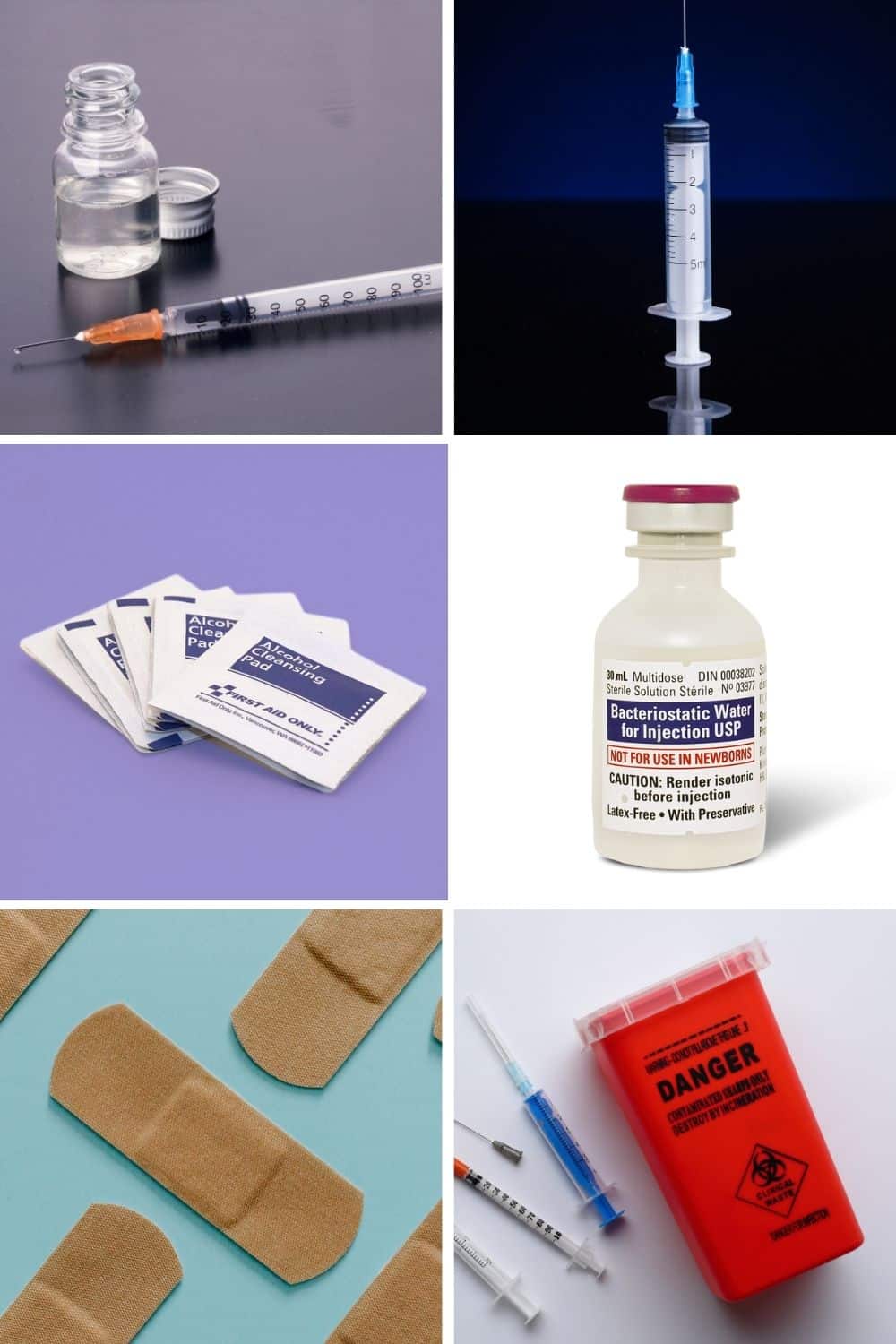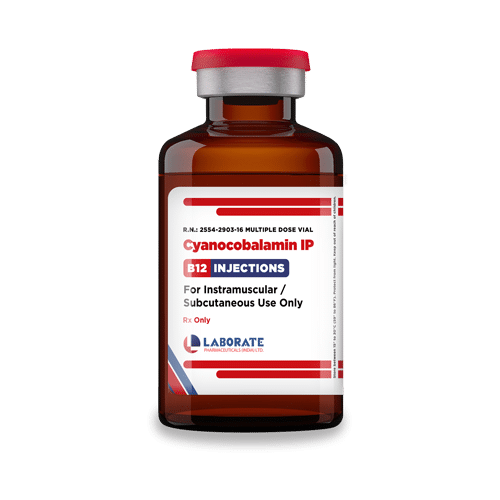“It’s been several months now and I’m proud to say that I’ve lost a significant amount of weight. Not only do I look and feel better, but I’ve also gained a new level of confidence in myself. I’m so grateful for the journey and all of the challenges that came along with it, as they have helped me grow and become a healthier and happier person.”
Vitamin B12 Injections 30ml
$179.00 Original price was: $179.00.$129.00Current price is: $129.00.
IN STOCK
Vitamin B12, also known as cobalamin, is a vital water-soluble nutrient essential for DNA synthesis, red blood cell production, and optimal brain function.
Found primarily in animal products, it plays a crucial role in energy metabolism and maintaining nerve health.
Ensuring adequate B12 intake is especially important for vegetarians, vegans, and the elderly, as deficiencies can lead to anemia and neurological issues.
- 1 Vial of 30ml B12 Shots
- Mixing / Administration Supplies
- Free shipping (USD 240+)
| Title | Range | Discount |
|---|---|---|
| Bulk Discount | 2 - 4 | 10% $116.10 |

- Wendi

“My experience with usahcg.com was smooth, and even though I was worried about the low-calorie diet, I surprisingly found it easy to stick to. As a result, my clothes fit now better and i feel better around people.”
- Pammy

“I was a long time on the fence, and previous struggles/failures filled me with uncertainty. But my relentless battle with weight loss nudged me to take the leap. To my delight, usahcg.com made the entire process a breeze, and conquering the low-calorie diet became an empowering experience.”
- Sarah
Vitamin B12 Injections Info

Vitamin B12, also known as cobalamin, is a water-soluble vitamin crucial for numerous bodily functions. It is vital for DNA synthesis, red blood cell production, brain function, nerve health, and maintaining the body’s nerve and blood cells.
Natural Sources: Vitamin B12 is primarily found in animal foods such as meat, fish, eggs, and dairy. However, fortified foods like cereals and nutritional yeast also contain this vitamin. For adults, the recommended daily intake is approximately 2.4 mcg, which can be conveniently achieved through diet.
Deficiency Risks: Deficiencies in vitamin B12 are notably prevalent among vegetarians, vegans, and the elderly. A deficiency arises when the body fails to absorb sufficient B12 from food over prolonged periods. If untreated, low vitamin B12 levels can result in anemia, fatigue, weakness, and nerve complications.
Treatment – Vitamin B12 Injections: For those with a deficiency, vitamin B12 injections, either administered intramuscularly or subcutaneously, can elevate B12 levels. These injections are especially beneficial when oral supplementation proves inadequate.
Benefits and Dosage of B12 Shots
 Main Benefits of B12 Shots
Main Benefits of B12 Shots
- Increased Energy Levels: B12 significantly influences energy production and metabolism, providing a boost in energy.
- Improved Brain Function: Essential for memory, mood, and concentration, rectifying a B12 deficiency can enhance these cognitive processes.
- Boosted Immunity: By aiding in antibody and white blood cell production, B12 can fortify the immune system.
- Red Blood Cell Production: B12 assists in the creation of oxygen-carrying red blood cells, staving off fatigue and anemia.
- Healthier Skin, Hair, and Nails: B12 promotes cell reproduction and growth, thus benefiting the health of skin, hair, and nails.
- Enhanced Metabolism: Essential for the metabolism of fats and carbohydrates, B12 might invigorate a languid metabolism.
- Improved Mood: By aiding in the production of “feel-good” neurotransmitters like serotonin, B12 could alleviate depression and anxiety.
Proper Use and Dosage of B12 Shots
The dosage and regimen for vitamin B12 injections can differ based on individual needs. Some general guidelines include:
- Dosage: Typically, B12 injections contain 500 – 1,000 mcg (1 mg) of B12 per milliliter. A routine dosage ranges from 500-2,000 mcg 1-3 times weekly.
- Frequency: Initially, injections might be administered daily or every other day to restore B12 levels. Maintenance usually involves one injection every 2 weeks or monthly.
- Administration: Injections are subcutaneously applied into the abdomen, thighs, or arms. Intramuscular injections are possible more difficult if self-administered.
- Duration: The period for B12 injections varies based on the deficiency’s cause. Some might need lifelong maintenance injections.
- Monitoring: Regular bloodwork determines the required dosage and injection frequency. B12 levels are typically reassessed after 3-6 months.
Potential Side Effects and Who Should Consider Vitamin B12 Supplementation?
 Are there any Side Effects?
Are there any Side Effects?
While vitamin B12 injections are predominantly safe, some individuals might experience side effects such as:
- Mild diarrhea
- Itching, rash, or redness at the injection site
- Headache, dizziness, nausea, or vomiting
- Swelling sensation, cough, or shortness of breath
- Chest tightness, rapid heartbeat, or blood clots (rare) Severe side effects, although infrequent, require immediate medical attention.
Who Should Consider B12 Injections
Certain groups are more susceptible to vitamin B12 deficiency and might benefit from B12 injections:
- Vegetarians or vegans
- Older adults
- Those with gastrointestinal ailments such as celiac or Crohn’s disease
- Individuals who’ve undergone gastrointestinal surgeries
- Patients with conditions impacting B12 absorption or those on specific medications
- Those with particular health conditions or surgeries
- Individuals experiencing fatigue, reduced energy, or mood disturbances
FAQ's - Important Vitamin B12 Info
What are the main benefits of B12 injections?
B12 injections can significantly increase energy levels, improve brain function including memory, mood, and concentration, and boost immunity. They also assist in the production of red blood cells, helping to prevent fatigue and anemia.
Additionally, B12 is beneficial for the health of skin, hair, and nails, and plays a crucial role in the metabolism of fats and carbohydrates. It may also improve mood by aiding in the production of neurotransmitters like serotonin.
What happens when you start Vitamin B12 injections?
Based on the search results, injectable B12 shots start working very quickly, typically showing noticeable positive effects within 24-72 hours after the first injection. Here is a summary:
- B12 injections bypass the digestive system and are delivered directly into the bloodstream, allowing the vitamin B12 to start working immediately.
- Most patients report feeling positive effects of increased energy, improved mood, clearer thinking, etc. within 24-48 hours after their first B12 shot.
- People with severe B12 deficiencies may require a few injections over several weeks before experiencing peak benefits. But improvements are often noticed after the first injection.
- In contrast to injections, B12 oral supplements can take much longer to show effects since they must be absorbed through the digestive tract first.
How are Vitamin B12 injections self-administered?
Administering B12 injections subcutaneously at home is straightforward and safe. With essential supplies like medication, syringes, and alcohol swabs, you simply clean the injection site (such as the arm, thigh, or abdomen), draw and prepare the dose, and inject into the skin at a 45° angle. This method, involving a shorter needle, is easy to self-administer and reduces the risk of complications.
What is the recommended dosage and frequency for B12 injections?
The typical dosage for B12 injections ranges from 500-2,000 mcg 1-3 times weekly. Initially, injections might be administered daily or weekly to restore B12 levels, with maintenance usually involving one injection monthly. The exact dosage and frequency depend on individual needs, and regular bloodwork may be necessary to determine the required dosage and injection frequency. B12 levels are typically reassessed after 3-6 months.
Are there any side effects of B12 injections?
While B12 injections are generally safe, some individuals might experience side effects such as mild diarrhea, itching, rash, or redness at the injection site. Other possible effects include headache, dizziness, nausea, vomiting, swelling sensation, cough, shortness of breath, and, in rare cases, chest tightness, rapid heartbeat, or blood clots. Severe side effects are infrequent, but they require immediate medical attention.
How long does the bottle last?
A 30ml vial of B12 Shots, taken at a dosage of 1/2ml every other day will last for approximately 120 days. This duration translates to about 17 weeks or 4 months. Given the maintenance dose is administered less frequently, then Vial may last even longer.
Why is the liquid red in color?
Injectable vitamin B12, typically in the forms of cyanocobalamin and hydroxocobalamin, exhibits a red or brown color inherent to the liquid itself, not the vial. These forms of B12 naturally possess a deep red hue, imparting this color to the solution.
Can i drink the B12 Liquid instead of injecting it?
Yes, cyanocobalamin, a form of Vitamin B12, can be taken orally, as in this liquid, to treat or prevent B12 deficiency. However, injectable B12 may be recommended for more direct and efficient absorption in cases of severe deficiency or specific medical conditions. Keep that in mind and double the dosage if taken orally. You can mix the solution into some drink or food and consume it.
General Mixing - Administration Instructions
Subcutaneous (SC) Injections
Your injectable product can be self-administered at home with proper technique.
Why subcutaneous injections over intramuscular injections?
Subcutaneous injections for administering medication at home, are often preferred over intramuscular injections because they are easier to follow, and safer for self-administration.
Subcutaneous injections involve a shorter and thinner needle and are injected into the fatty tissue under the skin, reducing the risk of hitting a nerve or blood vessel. Common injection sites for subcutaneous injections include the upper arm, abdomen, and thigh.

Needed Supplies
- Insulin Syringes. The syringe should have a fine needle around 28G-31G thickness and typically 8-12 millimeters in length.
- Mixing Syringes. A few 3ml or 5ml mixing syringes to transfer bacteriostatic water when diluting the product.
- Bacteriostatic Water: Bacteriostatic water is used to dilute lyophilized medications, providing a sterile medium that inhibits bacterial growth during reconstitution and storage.
- Rubbing Alcohol / Alcohol swabs / Gauze / Cotton Balls. Rubbing alcohol applied with a clean cotton ball or gauze can be used as an alternative to alcohol swabs to disinfect the working area, and the skin before a shot.
- Band Aid. Apply to the injection site after administration to prevent from bacteria.
- Sharps container. Used for the safe disposal of needles, syringes.
Products requiring reconstitution come with essential mixing and administration supplies. For additional needs, find convenient Amazon links provided: Bacteriostatic Water | Syringes.
Please dispose of any Sodium Chloride vials shipped to you within our supply kit packages, as they are unnecessary if you have bacteriostatic water.

Preparing
- Wash hands thoroughly and clean vial stopper with alcohol swab
- Choose an injection site like arm, thigh, or abdomen and clean with alcohol
Filling Syringe
- 1. Draw air into syringe equal to the dose you'd like to administer
- 2. Inject air into the medication vial to equalize pressure inside it
- 3. Withdraw the required dose, remove bubbles
Injecting
- Pinch 1 inch of skin, inject at 45° angle, push plunger slowly, withdraw needle
- Apply pressure with gauze, dispose of sharps, massage site
- Rotate the injection sites to avoid irritation
- Dispose of used syringes safely, protect from children

Products requiring reconstitution come with essential mixing and administration supplies. For additional needs, find convenient Amazon links provided: Bacteriostatic Water | Syringes.


 Main Benefits of B12 Shots
Main Benefits of B12 Shots Are there any Side Effects?
Are there any Side Effects?
Started B12 injections and noticed an immediate difference. More energy, less fatigue, and overall better mood.
I feel more awake and alert throughout the day.
Taking 1cc EOD.. works great!
My energy levels have never been better! Vitamin B12 injections have given me the boost
Vitamin B12 injections have been a life-saver. I was always feeling sluggish, but now I have so much more energy. I can’t believe the difference.